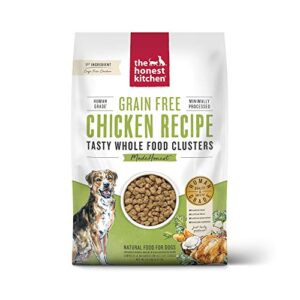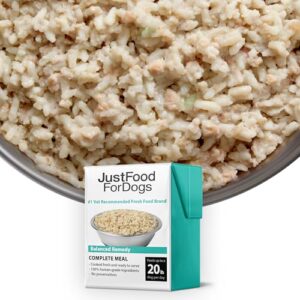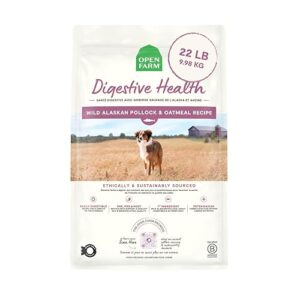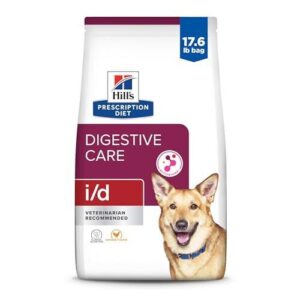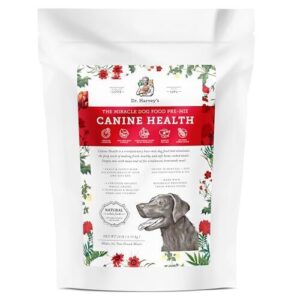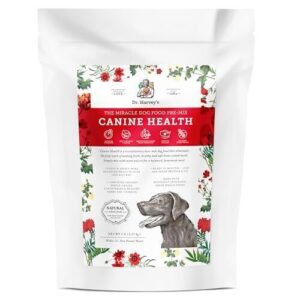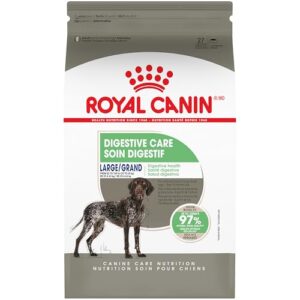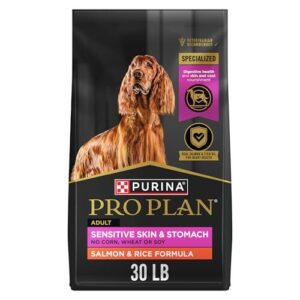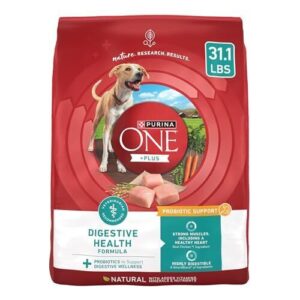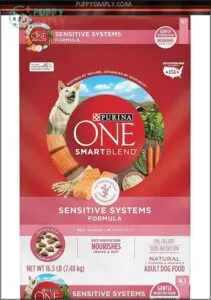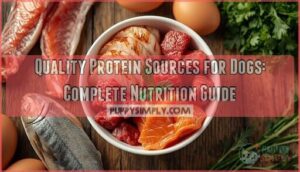This site is supported by our readers. We may earn a commission, at no cost to you, if you purchase through links.
Your dog’s stomach troubles tell a story. When digestive upset strikes repeatedly, you’re not dealing with bad luck—you’re witnessing your dog’s body signal that something isn’t working. Around 30% of veterinary visits for digestive issues trace back to diet alone, yet many dog owners struggle to find food that doesn’t trigger symptoms.
Natural dog food for sensitive stomachs tackles this problem by removing common irritants and providing easily digestible ingredients your dog’s system can handle. The right food doesn’t just stop the symptoms—it bolsters your dog’s gut health from the ground up.
Finding that match means understanding what causes sensitivity and which ingredients genuinely help versus those that simply claim to.
Table Of Contents
- Key Takeaways
- Causes and Signs of Sensitive Stomachs in Dogs
- Key Ingredients in Natural Dog Food
- Top 10 Natural Dog Foods for Sensitive Stomachs
- 1. Honest Kitchen Chicken Grain Free Clusters
- 2. JustFoodForDogs Balanced Remedy Dog Food
- 3. Open Farm Digestive Health Dog Food
- 4. Hill’s i/d Digestive Care Chicken
- 5. Dr Harvey’s Canine Health Miracle Food
- 6. Dr Harvey’s Canine Health Miracle
- 7. Royal Canin Large Dog Digestive Care
- 8. Sensitive Skin Salmon Dog Food
- 9. Purina One Digestive Health Dog Food
- 10. Purina ONE Sensitive Stomach Dog Food
- How to Choose The Right Food for Your Dog
- Tips for Managing and Transitioning Diets
- Frequently Asked Questions (FAQs)
- What food is best for dogs with sensitive stomachs?
- What is the best thing to feed a dog with an upset stomach?
- Are there specific breeds that benefit most from natural options?
- How long until sensitive stomach symptoms improve?
- Are grain-free diets better for sensitive stomachs?
- What role does water quality play in digestion?
- Should I rotate proteins for sensitive stomach dogs?
- Conclusion
Key Takeaways
- Natural dog food for sensitive stomachs works by removing common irritants like beef, dairy, and chicken while providing easily digestible proteins such as turkey, fish, or hydrolyzed options paired with simple carbohydrates like rice or oatmeal.
- Around 30% of digestive vet visits trace back to diet alone, but true food allergies affect only 1-2% of dogs—most issues stem from food sensitivities, stress, medications, or dietary indiscretion rather than immune responses.
- Probiotics like Bacillus coagulans at 200+ million CFU per pound combined with prebiotics and moderate fiber (around 5%) significantly improve stool quality and gut health, often showing results within 24-72 hours.
- Transitioning to new food requires a gradual 7-14 day schedule mixing old and new food in shifting ratios, paired with consistent feeding times to stabilize digestion and prevent symptoms like vomiting or diarrhea.
Causes and Signs of Sensitive Stomachs in Dogs
Your dog’s stomach issues might seem random, but they usually have clear causes you can identify. Recognizing the signs early helps you address the problem before it gets worse.
Let’s look at what triggers digestive sensitivities and how they show up in your dog’s daily behavior.
Common Causes of Digestive Sensitivities
Dietary indiscretion—like scavenging table scraps or spoiled food—causes up to 30% of digestive visits and remains the most common trigger of acute gastroenteritis. Food allergies affect around 10–15% of sensitive stomachs, with beef, dairy, and chicken among common food allergens.
Parasitic infections, medication effects (especially NSAIDs), and gut microbiome disruptions from antibiotics or stress also play significant roles in canine digestive issues. If a dog is experiencing sudden vomiting and diarrhea, it may be a sign of acute gastroenteritis.
Symptoms Indicating a Sensitive Stomach
Symptoms of a sensitive stomach vary but follow clear patterns. Diarrhea affects about 8% of dogs annually, while vomiting occurs in roughly half of dogs with pancreatic issues. You might also notice blood or mucus in stool, bloating, abdominal pain, or appetite changes. Lethargy often accompanies these gastrointestinal issues.
When symptoms persist beyond three weeks, they signal chronic enteropathy requiring veterinary attention. Websites sometimes experience technical difficulties, which can temporarily disrupt access to information.
Food Allergies and Intolerances
When persistent digestive troubles resist simple dietary adjustments, food allergies or intolerances might be the culprit. True food allergies affect only 1% to 2% of dogs with skin conditions, but among dogs with itchy skin, 10% to 24% test positive. Beef, chicken, dairy, and wheat top the list of common allergens. Here’s what sets them apart:
- Food allergies trigger immune responses causing skin irritation and gastrointestinal distress
- Food sensitivities involve non-immune reactions like enzyme deficiencies
- Elimination diet trials lasting 6 to 8 weeks identify about 95% of food-allergic dogs
- Limited ingredient dog food minimizes exposure to ingredients causing sensitivities in dogs
Your veterinarian can guide proper diagnostic trials to pinpoint the exact trigger.
Non-Food Triggers Affecting Digestion
Not all digestive issues stem from the food bowl. Stress and anxiety can trigger gastrointestinal problems in up to 49% of dogs during events like fireworks or travel. Environmental changes, such as moving, medications including antibiotics, infections, toxins, and even intense physical activity, can also upset your dog’s stomach.
Here’s a quick breakdown:
| Trigger | Common Examples | Key Symptoms |
|---|---|---|
| Stress & Anxiety | Boarding, loud noises, routine disruption | Diarrhea, vomiting, reduced appetite |
| Medications | NSAIDs, antibiotics, dewormers | Soft stools, nausea, microbiome changes |
| Infections & Toxins | Parasites, bacteria, household chemicals | Acute diarrhea, vomiting, abdominal pain |
Your veterinarian can help identify non-food triggers affecting your dog’s health and recommend supportive care beyond diet changes.
Key Ingredients in Natural Dog Food
When your dog’s stomach is acting up, the ingredients in their food matter more than you might think. The right combination of proteins, carbs, and gut-friendly additions can make all the difference between a happy pup and another messy cleanup.
Let’s look at what should be in your dog’s bowl—and what you’ll want to keep out.
Easily Digestible Protein Sources
Your dog’s stomach works best with proteins it can break down quickly. Lean protein from poultry options like chicken and turkey delivers digestibility rates above 90%, making them ideal animal protein sources.
Fish proteins offer similar benefits with added omega-3s. Novel proteins such as venison suit allergic dogs, while hydrolyzed proteins and plant proteins provide alternative digestible ingredients when traditional sources don’t work.
Beneficial Carbohydrates and Fibers
When choosing carbs for your dog’s sensitive stomach, rice and tapioca achieve digestibility rates above 90%, leaving minimal residue for fermentation. Plain pumpkin and oatmeal bring soluble fermentable fibers that regulate stool consistency—trials show improvement within 24 hours. Novel carbs like sweet potato suit grain sensitivities.
Balance matters: moderate fiber (around 5%) fosters prebiotic effects, while excess triggers bloating and reduces nutrient absorption.
Role of Probiotics and Prebiotics
Beyond single ingredients, probiotics and prebiotics work as a team to reshape your dog’s gut microbiota. Canine-specific strains like Lactobacillus deliver clinical benefits—one trial cut diarrhea recovery time by 24%—while prebiotics such as FOS and inulin boost immune defense by feeding beneficial bacteria.
Look for food formulations listing these near the top. Most dogs tolerate them within safety limits, though initial gas resolves quickly.
Ingredients to Avoid for Sensitive Dogs
Just as you wouldn’t feed yourself processed junk every day, your dog’s gut can’t handle certain artificial additives and allergens. Beef tops the trigger list at 34% of canine food allergies, followed closely by dairy and chicken at 17–20% each.
- Artificial colors like Red 40 and Blue 1 cause DNA damage and offer zero nutritional value
- High-fat formulations can overwhelm digestion and precipitate acute pancreatitis
- Lactose in dairy triggers diarrhea and bloating within 30 minutes in most dogs
Top 10 Natural Dog Foods for Sensitive Stomachs
Now that you know what to look for in a sensitive stomach formula, let’s examine the best natural dog foods available in 2025.
Each product on this list offers specific benefits for dogs dealing with digestive issues. We’ve evaluated these foods based on ingredient quality, digestibility, and their track record with sensitive stomachs.
1. Honest Kitchen Chicken Grain Free Clusters
You won’t find many dry dog foods that match the digestible ingredients and manufacturing safety of The Honest Kitchen Chicken Grain Free Clusters. This formula features cage-free chicken, potatoes, peas, and beneficial probiotics like Bacillus coagulans—shown in AAFCO trials to support healthy stool quality and gut microbiota.
It delivers 26% protein and roughly 422 kilocalories per cup, so portion control matters. With human-grade ingredient quality and no synthetic preservatives, it’s a standout option for dogs with food sensitivities seeking natural, well-tolerated nutrition.
Best For: Dogs with sensitive stomachs or food allergies who need a high-quality, human-grade dry food with digestible ingredients and proven gut health support.
- Contains cage-free chicken, probiotics (Bacillus coagulans), and fiber sources like pumpkin that support healthy digestion and stool quality, backed by six-month AAFCO feeding trials
- Human-grade ingredients with no fillers, meat meals, or synthetic preservatives, cold-pressed and slow-roasted to preserve nutrients while meeting food safety standards
- Solid macronutrient profile with 26% protein and omega fatty acids for metabolism, skin, and coat health in active adult dogs
- Higher price point compared to conventional dry dog foods, which may not fit all budgets
- Energy-dense at 422 calories per cup, requiring careful portion control to prevent weight gain in less active dogs
- Some customers report shipping issues with damaged bags, occasional powdery texture, or dogs refusing to eat it
2. JustFoodForDogs Balanced Remedy Dog Food
When digestive issues demand clinical precision, JustFoodForDogs Balanced Remedy delivers therapeutic support in a human-grade package. This low-fat formula uses ground turkey and white rice—ingredients chosen for maximum digestibility—and meets AAFCO compliance for adult maintenance.
With just 1–4% crude fat, it’s formulated for pancreatitis-prone dogs and sensitive stomachs. Feeding guidelines recommend approximately 7 oz daily for a 10-pound dog.
Balanced Remedy wasn’t affected by the brand’s 2018 recall, and its limited-ingredient approach helps you identify food sensitivities while supporting recovery from gastrointestinal upset.
Best For: Dogs with pancreatitis, chronic digestive issues, or sensitive stomachs who need a clinically formulated, low-fat diet with limited ingredients.
- Therapeutic low-fat formula (1–4% fat) specifically designed for pancreatitis and gastrointestinal conditions
- Human-grade ingredients with single protein (turkey) and single starch (rice) for easy allergen identification
- Shelf-stable Pantry Fresh option provides convenience without sacrificing fresh-food quality
- Premium price point makes it one of the more expensive therapeutic options on the market
- Some users report inconsistent ingredient distribution, making it difficult to find meat pieces in certain packages
- Very low protein content (5% minimum) may not suit all dogs, particularly active or large-breed adults
3. Open Farm Digestive Health Dog Food
If you’re looking for transparent sourcing alongside digestive support, Open Farm Digestive Health Pollock & Oatmeal offers ingredient traceability down to the farm. This formula features wild Alaskan pollock protein—a novel option if your dog reacts to chicken or beef—and delivers 200 million CFU of Bacillus coagulans probiotics per pound for measurable probiotic effectiveness.
Oatmeal and pumpkin provide gentle fiber, while the brand’s clean recall history and rigorous testing protocols add confidence.
At roughly $4 per pound for the 22-lb bag, cost analysis reveals premium pricing, but many owners find the digestible ingredients worth it for managing chronic digestive issues.
Best For: Dogs with sensitive stomachs or chronic digestive issues who need traceable, novel-protein nutrition with clinically dosed probiotics.
- Wild Alaskan pollock and oatmeal provide a novel protein and gentle fiber combo that many dogs with food sensitivities tolerate well
- Delivers 200 million CFU of Bacillus coagulans per pound plus prebiotics and postbiotics for measurable gut support
- Clean recall history and farm-to-bowl traceability give you confidence in ingredient quality and sourcing
- Premium pricing at around $4 per pound makes it one of the more expensive digestive-support options
- Some dogs may not love the taste or smell of pollock compared to more familiar proteins like chicken
- The formula may not solve severe allergies or extremely sensitive cases that require prescription-level diets
4. Hill’s i/d Digestive Care Chicken
When digestive issues turn severe—think persistent vomiting or chronic diarrhea—Hill’s Prescription Diet i/d Digestive Care offers clinical-grade support. This veterinarian-prescribed formula features highly digestible chicken and brewers rice at 23.7% protein, plus ActivBiome+ prebiotics that encourage beneficial gut bacteria.
The added B vitamins and electrolytes replace nutrients lost during gastrointestinal upset. Though the 2019 recall involving canned formulas raised concerns, the dry food wasn’t affected.
At $98.97 for 17.6 pounds, you’re paying for therapeutic intervention backed by feeding trials—ideal for managing colitis or post-surgery recovery.
Best For: Dogs with severe or chronic digestive issues like persistent vomiting, diarrhea, colitis, or those recovering from gastrointestinal surgery who need veterinary-supervised therapeutic nutrition.
- Highly digestible formula with ActivBiome prebiotics helps settle upset stomachs and supports beneficial gut bacteria for better digestive health
- Includes added B vitamins and electrolytes to replace nutrients lost during vomiting and diarrhea episodes
- Clinically tested and backed by AAFCO feeding trials, making it a trusted choice recommended by veterinarians for serious GI conditions
- Requires a veterinarian prescription, so you can’t just pick it up without a vet visit
- Expensive at $98.97 for 17.6 pounds compared to regular dog food
- Once opened, the bag only stays fresh for 2-3 weeks, and availability can be spotty since it often sells out quickly
5. Dr Harvey’s Canine Health Miracle Food
While prescription formulas help manage disease, some owners prefer building meals from scratch. Dr. Harvey’s Canine Health Miracle Food offers that middle ground—a dehydrated base mix of six organic grains and nine vegetables that you rehydrate and combine with your choice of protein and oil.
This customization lets you control ingredient quality and avoid allergens, making it useful for dogs with food sensitivities.
The 10-pound bag yields roughly 66 meals at $83–$90, though preparation takes more effort than pouring kibble, and some dogs find the texture unappealing.
Best For: Dog owners who want to customize their pet’s diet with fresh protein while using an organic, dehydrated base mix—especially helpful for dogs with food sensitivities or allergies.
- You control the protein source and quality, making it easier to avoid allergens and tailor meals to your dog’s specific needs.
- The organic grain and vegetable base provides digestible fiber that can support better digestion and firmer stools.
- No recalls in 40 years of production, and the mix is free from artificial preservatives, colors, and fillers.
- Requires more prep work than kibble—you need to rehydrate the mix and add your own protein and oil for every meal.
- More expensive per serving than most commercial dog foods, with a 10-pound bag running $83–$90.
- Some dogs don’t like the taste or texture, and it’s not nutritionally complete without adding protein and fat.
6. Dr Harvey’s Canine Health Miracle
Dr. Harvey’s Canine Health Miracle is basically the same dehydrated base-mix—don’t let the name confuse you. It’s built on six organic grains, nine vegetables, and herbs that you rehydrate with warm water, then pair with your protein of choice and oil.
This flexibility promotes digestive health by letting you sidestep common allergens and adjust fat levels for dogs prone to upset. At roughly 70 calories per scoop before additions, it’s easy to control portions and tailor meals to your dog’s unique needs.
Best For: Dog owners who want full control over their pet’s protein sources and fat levels, especially helpful for dogs with sensitive stomachs, allergies, or specific dietary restrictions.
- Lets you customize the protein and oil to avoid allergens or adjust fat content based on your dog’s digestive needs
- Made with human-grade organic grains and nine vegetables, no synthetic additives or preservatives
- Long shelf life as a dehydrated mix with no recalls in 40 years of operation
- Requires prep work—you need to rehydrate, add your own protein and oil, then store the finished meals
- More expensive than standard kibble, and total cost depends on what protein you choose to add
- Not a complete meal on its own; you have to follow mixing instructions carefully to ensure balanced nutrition
7. Royal Canin Large Dog Digestive Care
When your large dog struggles with sensitive stomachs, Royal Canin Large Dog Digestive Care stands out. This dog food uses specific kibble size and highly digestible protein sources to support digestive health.
Digestibility trials show improvements in stool quality, which means less mess and more comfort for your dog.
You’ll find feeding guidelines that adjust for activity levels, so energy needs are met without overloading the gut. It’s a solid choice if digestive issues and stool consistency are top concerns in your household.
Best For: Large dog owners dealing with sensitive stomachs or inconsistent stool quality who want a digestive-focused formula backed by feeding trials.
- Highly digestible proteins and specialized fibers improve stool consistency and reduce digestive upset
- Feeding guidelines adjust for three activity levels, making it easier to match your dog’s energy needs
- Widely available through major retailers with proven palatability in customer reviews
- Premium pricing at $3.34–$3.67 per pound means higher ongoing costs compared to standard kibble
- Some picky eaters may need wet food mixed in to maintain interest
- Strong scent from wet food pairings can affect your dog’s breath
8. Sensitive Skin Salmon Dog Food
When your dog battles both skin allergies and sensitive stomachs, salmon-based formulas offer dual relief. Salmon benefits include naturally high omega-3 fatty acids that reduce itching and support skin health while remaining gentle on digestion.
Some salmon oatmeal formulas pair easily digestible oats with probiotic support—like Bacillus coagulans—to balance gut flora. Hydrolyzed salmon diets break protein into smaller pieces, reducing allergic reactions for dogs with multiple sensitivities.
The omega fatty acids in fish-first recipes also improve coat quality and barrier function, making this dog food a smart pick for layered digestive and dermatologic needs.
Best For: Dogs dealing with both skin allergies and sensitive stomachs who need a protein source that’s easy to digest and less likely to trigger reactions.
- High omega-3 content from salmon reduces itching, inflammation, and supports healthier skin and coat
- Includes live probiotics and easily digestible ingredients like oatmeal to support gut health
- Salmon is a less common allergen than chicken or beef, making it useful for dogs with multiple food sensitivities
- Typically more expensive than chicken or beef-based formulas
- Some quality control issues reported, including occasional contamination concerns
- May take 4 weeks to see noticeable improvements in skin and digestive symptoms
9. Purina One Digestive Health Dog Food
When digestibility factors matter most, Purina ONE’s chicken-based formula delivers real results at a reasonable price point. This dry dog food features real chicken as the first ingredient and includes 600 million CFU/lb of Bacillus coagulans probiotics to support gut flora.
The cost analysis is compelling—at $49.98 for 31.1 pounds, you’re getting ingredient quality without breaking the bank. Feeding guidelines scale from half a cup for toy breeds to over four cups for large dogs, making portion control straightforward when you’re managing digestive issues.
Best For: Dog owners dealing with sensitive stomachs or digestive issues who want a vet-recommended formula with probiotics and real chicken at a mid-range price.
- Real chicken as the first ingredient plus 600 million CFU/lb of probiotics specifically targets digestive health
- Good value at $49.98 for 31.1 pounds compared to premium digestive formulas
- Clear feeding guidelines that scale easily from small to large breeds, making portion control simple
- Higher price point than standard dog foods may not fit all budgets
- Limited flavor options could be an issue if your dog is picky or gets bored easily
- May not work for dogs with severe food allergies or sensitivities that need prescription diets
10. Purina ONE Sensitive Stomach Dog Food
When salmon takes the lead in your dog’s bowl, you’re choosing a protein that’s both gentle and nutritious. This formula pairs salmon first with rice, oatmeal, and barley—grain inclusion that aids digestibility claims without overwhelming sensitive stomachs.
At 26% protein and 16% fat, it tends to both digestive issues and skin benefits through added vitamin E and omega fatty acids.
Feeding guidelines start at one-third cup for small breeds and scale to four cups for larger dogs, making portion control straightforward for managing dog food sensitivities with digestible ingredients.
Best For: Dogs with sensitive stomachs and skin issues who need easily digestible nutrition with real salmon and omega fatty acids to support both digestive health and coat quality.
- Real salmon as the first ingredient delivers 26% protein with easy-to-digest grains like rice, oatmeal, and barley for dogs prone to upset stomachs
- Vitamin E and omega-6 fatty acids support healthy skin and a shiny coat, while omega-3s help reduce inflammation related to itching and scratching
- Natural glucosamine sources at 350 ppm support joint health, and the crunchy kibble helps clean teeth—all without artificial colors, flavors, or preservatives
- Some dogs experience diarrhea or vomiting, and opinions on digestibility are mixed despite the sensitive stomach claim
- Contains chicken by-product meal and grain-based proteins like corn protein meal, which may not suit dogs needing grain-free or highly limited ingredient diets
- Amazon pricing tends to run higher than other retailers, and the formula may not work for all dogs with food sensitivities based on mixed user reports
How to Choose The Right Food for Your Dog
Finding the right food for a dog with a sensitive stomach isn’t always straightforward. You’ll need to look beyond marketing claims and focus on what’s actually in the bag and how it matches your dog’s specific needs.
Here are four key factors to keep in mind when making your choice.
Evaluating Ingredient Lists and Quality
When you flip a bag of dog food over, think of the ingredient list as your roadmap to digestible ingredients and ingredient quality. Protein sources should appear first—look for named meats like chicken or salmon rather than vague terms. Check fiber content next, aiming for moderate levels that support stool quality.
Additives avoidance matters too: skip artificial colors and preservatives. Quality assurance from trusted brands using gentle processing methods helps reduce food sensitivities in dogs with delicate stomachs.
Limited Ingredient and Prescription Diets
When your dog’s stomach feels like a puzzle with too many pieces, ingredient simplification can bring relief. Limited ingredient diets restrict protein and carb sources, improving clinical improvement in over half of dogs with food sensitivities.
Hydrolyzed efficacy is even stronger—prescription food breaks proteins into tiny fragments your dog’s gut won’t react to.
Always seek veterinary guidance before choosing these specialized options for diet safety.
Matching Food Type to Life Stage and Breed
Once you’ve zeroed in on the right ingredient list, your dog’s age and size become the next guideposts. Puppy food needs higher protein—about 22.5% on a dry-matter basis—to fuel rapid growth, while adult maintenance diets dial that back to 18%.
Senior digestion support often means lower calories but nutrient-dense formulas to preserve lean mass. Breed-specific nutrition and caloric density considerations matter too: small breeds burn energy faster, so they need more kilocalories per pound than large dogs with sensitive stomachs.
Consulting Your Veterinarian for Guidance
Even with the best ingredient list, you’ll want your veterinarian on speed dial. They can run diagnostic testing—blood work, fecal exams, or imaging—to rule out pancreatitis or inflammatory bowel disease.
A supervised diet trial over eight weeks helps pinpoint food sensitivities, and regular follow-up care ensures the new dog food actually settles your pup’s digestive issues instead of masking deeper problems.
Tips for Managing and Transitioning Diets
Switching your dog to a new food isn’t something you should rush. Even the best sensitive stomach formula can cause upset if you make the shift too quickly or overlook key management steps.
Here are practical strategies to help your dog adapt smoothly and keep their digestive system stable.
Gradual Food Transitions for Digestive Health
When changing dog food for sensitive stomachs, you’ll want to follow a 7–14 day timeline that allows enzyme adaptation and microbiome stability. Start with 25% new food mixed with 75% old, gradually shifting the ratio every 2–3 days.
Monitoring symptoms like stool firmness helps you catch food sensitivities early. Adjunct therapies such as probiotics support digestive health during this critical period.
At-Home Remedies for Sensitive Stomachs
While your dog adjusts to new food, you can ease digestive issues with simple bland diet staples. Short-term at-home remedies include:
- Boiled chicken and white rice for 3–4 days to calm acute diarrhea
- Plain pumpkin (1–4 tablespoons) to normalize stool consistency
- Low-sodium bone broth for gentle hydration
- Plain yogurt with live cultures for probiotic support
- Rice water as an easily absorbed fluid source
These homemade options work best for mild upset before veterinary intervention.
Monitoring Stool Quality and Digestive Changes
Your dog’s fecal quality reveals whether the new food is working. Track stool consistency on a 1–7 scale—scores of 2–3 are ideal.
Watch defecation frequency, blood/mucus indicators, and color changes daily. If diarrhea or constipation persists beyond 72 hours, bring a stool sample to your vet.
Weight changes and appetite shifts also signal digestive issues needing attention.
The Importance of Consistent Feeding Routines
Surprisingly, feeding your dog at the same times each day can dramatically improve sensitive stomach symptoms. Fixed meal schedules stabilize the digestive system and reduce episodes of vomiting, diarrhea, and mealtime anxiety.
Fixed meal schedules can dramatically improve sensitive stomach symptoms by stabilizing digestion and reducing vomiting, diarrhea, and mealtime anxiety
- Digestive Stability: Two to three evenly spaced meals prevent bile vomiting and maintain regular bowel movements
- GDV Prevention: Scheduled portions lower gastric dilatation risk in large breeds by 2.7 times
- Appetite Regulation: Consistent timing prevents overeating and obesity-related digestive issues
- Smoother Transitions: Fixed mealtimes reduce diarrhea when changing your dog’s diet
- Stress Reduction: Predictable routines minimize anxiety-triggered gastrointestinal flare-ups
Regular feeding times support long-term dog digestive health and help you monitor your sensitive stomach dog’s progress.
Frequently Asked Questions (FAQs)
What food is best for dogs with sensitive stomachs?
Like finding the right key for a lock, the best dog food for sensitive stomachs features easily digestible protein sources, moderate dietary fiber, and probiotic benefits—all while avoiding common food sensitivities through high ingredient quality.
What is the best thing to feed a dog with an upset stomach?
A bland diet of boiled chicken and white rice works best for upset stomachs. Feed small portions four to six times daily, and add probiotics to support recovery.
Avoid fatty foods and consult your veterinarian if diarrhea persists.
Are there specific breeds that benefit most from natural options?
Certain pups simply don’t handle kibble well. Great Danes, German Shepherds, French Bulldogs, and retrievers face higher digestive trouble rates—making clean, whole-ingredient dog food essential for their sensitive stomachs and breed-specific gut physiology.
How long until sensitive stomach symptoms improve?
Most dogs with sensitive stomachs show acute symptom relief within 24 to 72 hours on a bland diet.
However, long-term stabilization often requires several weeks as the digestive system adjusts and gut microbiota adapt.
Are grain-free diets better for sensitive stomachs?
Don’t fall for the hype—grain-free diets aren’t automatically better for sensitive stomachs. True grain allergies account for under 10% of food reactions, while protein sources like beef cause most issues in dogs.
What role does water quality play in digestion?
Your dog’s hydration levels and the mineral content in their water directly affect their digestive system.
Water contaminants like metals and bacteria can trigger gastrointestinal upset, while filtered water promotes healthier gut microbiome function.
Should I rotate proteins for sensitive stomach dogs?
Protein rotation can benefit digestive health by supporting microbiome diversity. However, rotation risks include cross-reactivity and triggering food allergies.
You’ll need gradual introduction protocols and veterinary supervision before rotating dog food ingredients in sensitive stomachs.
Conclusion
Like finding the right key for a stubborn lock, choosing natural dog food for sensitive stomachs requires patience and attention to detail. Your dog’s digestive comfort depends on ingredients that nourish rather than irritate.
Start with limited protein sources and gradually introduce new foods while monitoring your dog’s response. Trust your veterinarian’s guidance and your own observations.
When you match the right food to your dog’s needs, those troubling symptoms fade and vitality returns.
- https://www.akc.org/expert-advice/nutrition/best-dog-food-sensitive-stomachs/
- https://www.petmd.com/dog/nutrition/limited-ingredient-dog-food-it-right-your-dog
- https://pmc.ncbi.nlm.nih.gov/articles/PMC10424612/
- https://www.cambridge.org/core/journals/nutrition-research-reviews/article/exploring-the-efficacy-and-optimal-dosages-of-omega3-supplementation-for-companion-animals/118271BA20C2863CF770CB7960145015
- https://www.aafco.org/consumers/understanding-pet-food/






